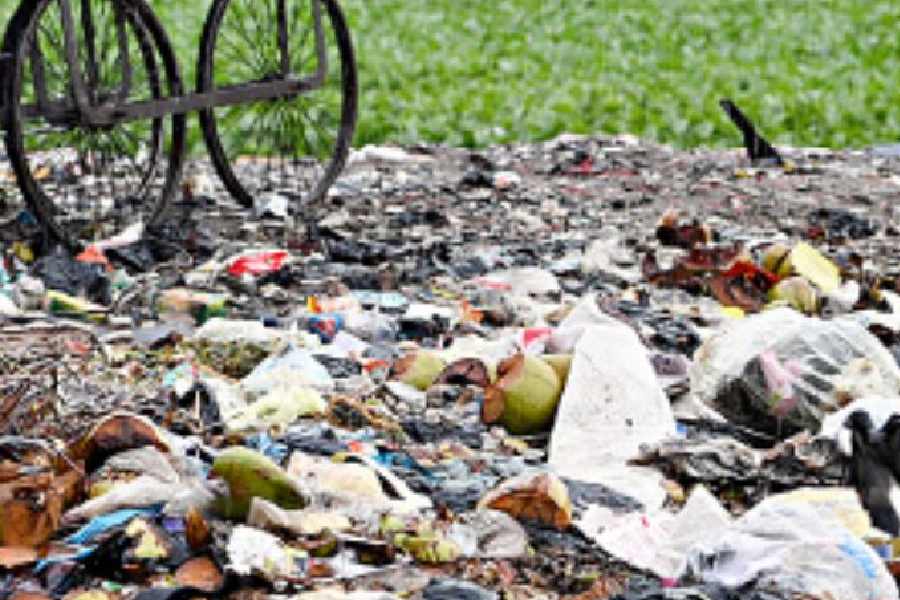Multiple places along Picnic Garden Road, where lived the 10-year-old girl who died of dengue last week, have piles of garbage that can turn into mosquito-breeding sites.
The situation was similar in many other parts of Calcutta, a tour of the city by The Telegraph on Tuesday revealed.
Piles of garbage that had many discarded green coconut shells were found along Topsia Road when thisnewspaper visited the neighbourhood. Choked drainsand footpaths filled with discarded teacups containing rainwater were found in Kasba, about 100m from Acropolis Mall.
Dengue infections are on the rise and the situation could worsen if steps are not taken immediately to prevent breeding of mosquitoes, doctors and entomologists said.
The dengue virus is spread by the Aedes aegypti mosquito, which can lay eggs even in a spoonful of water. Adult mosquitoes emerge a week after eggs are laid if the water remains undisturbed. So, public health experts urge people to drain out stagnant water at least once a week.
An official of the Calcutta Municipal Corporation (CMC) said over 200 dengue cases have been reported in the Calcutta municipal area since January.
A 10-year-old girl from Picnic Garden died at a city hospital on Saturday after testing positive for dengue.
On Friday, a 30-year-woman, who was a resident of Bangur Avenue, in the Lake Town police station area, passed away in a hospital in the city. The death certificate mentioned "dengue shock syndrome" as an antecedent cause of death.
A resident of Picnic Garden told this newspaper on Tuesday evening that there were some vacant plots in the neighbourhood where piles of garbage have accumulated. Accumulated waste always has containers, tyres, coconut shells and bottles, each of which can turn into mosquito-breeding sites.
An official of the Calcutta Municipal Corporation (CMC) said they issue notices to owners of such vacant plots asking them to clean their properties. If the owners do not clean them, the CMC cleans the plots and recovers the cost from the owners.
Despite the claim, there are multiple garbage-filled plots across the city.
Besides, green verges close to tea stalls or rarely visited parts of a neighbourhood also turn into waste dumping sites and are rarely cleaned.
"The Aedes aegypti mosquito, the primary transmitter of the dengue virus, can breed even in a teaspoon of water. They are known to be small-container breeders. A teacup or a small plate thrown and not removed for days can turn into a breeding site for mosquitoes," said an entomologist.
"Aedes mosquitoes breed in freshwater. Eggs can transform into adult mosquitoes in seven days if the water is not thrown away."
The website of the World Health Organisation (WHO) mentions that the "prevention and control of dengue depend on vector control".
"The best preventive measure for areas infested with Aedes mosquito is to eliminate the mosquitoes’ egg laying sites — called source reduction. Lowering the number of eggs, larvae and pupae will reduce the number of emerging adult mosquitoes and the transmission of the disease," the WHO website says.
The entomologist said Anopheles stephensi, the primary vector of the malaria parasite in urban India, also breeds in freshwater accumulated in a container that remains undisturbed for at least seven days.
Uncleaned drains are a threat because people tend to throw waste into them.
